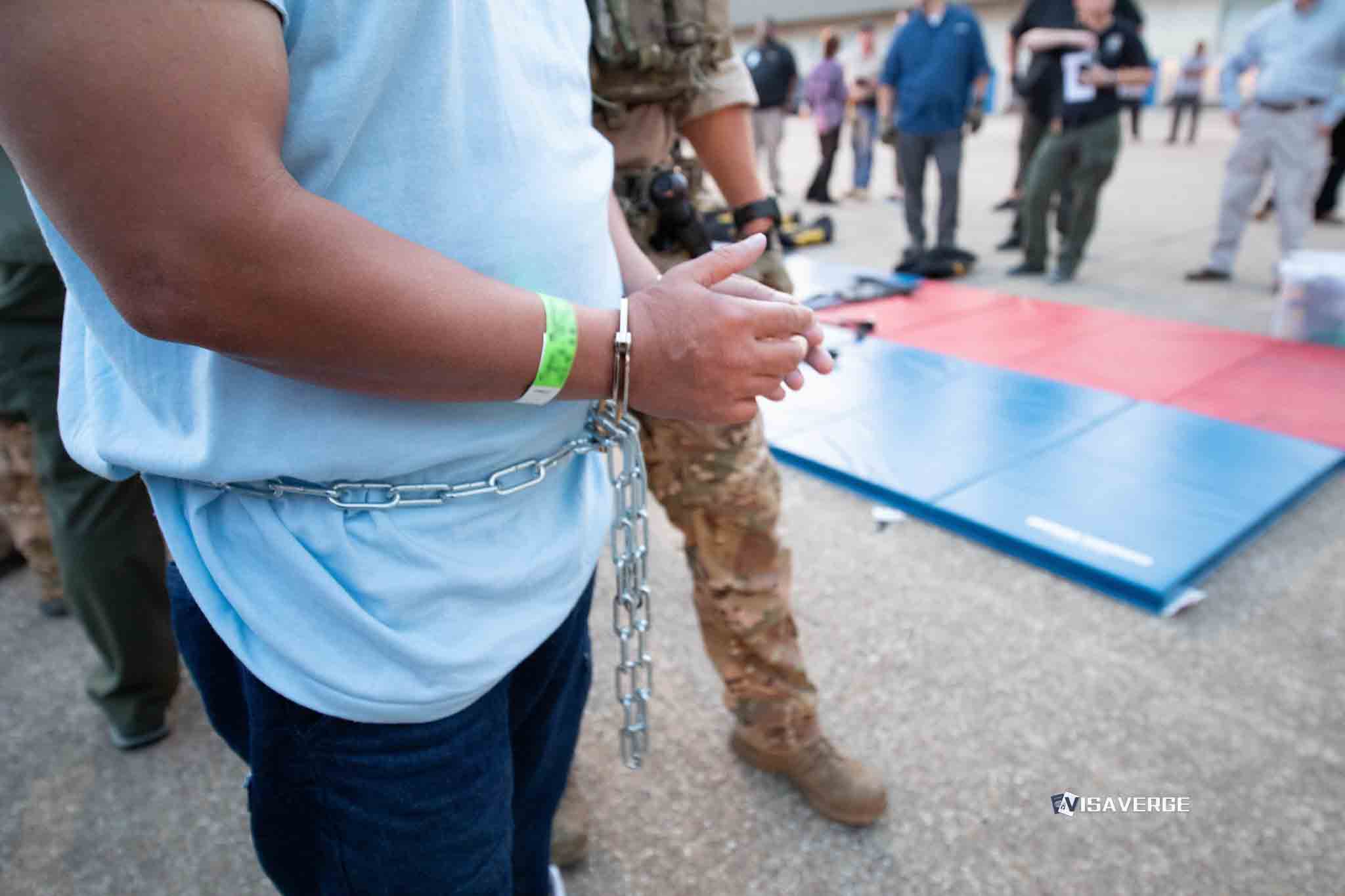(CHARLOTTE, NORTH CAROLINA) A large-scale Border Patrol operation in the Charlotte area, known as “Charlotte’s Web,” ended on Thursday, November 20, 2025, bringing a tense five-day sweep to a close but leaving deep concern in local immigrant communities. The Mecklenburg County Sheriff’s Office said it confirmed with federal officials that no border agent activity tied to the operation would take place on Thursday, even as people in some neighborhoods remained afraid to step outside.
Overview of the operation and timeline

The operation, run by U.S. Customs and Border Protection (CBP) with support from federal immigration officers, began over the weekend and led to more than 250 arrests in just five days, according to local authorities. It was part of President Trump’s wider push for mass deportation efforts in Democratic-run cities across the United States, including Chicago and Los Angeles, where similar raids and targeted actions have been reported.
Many in Charlotte said the name “Charlotte’s Web” felt bitter — turning the title of a beloved children’s book, Charlotte’s Web, into a label for a dragnet that pulled families apart and kept people inside their homes.
Official statements and local response
Sheriff Garry McFadden’s office said it had spoken directly with federal officials before announcing the end of the Border Patrol operation. The sheriff confirmed:
- Specialized teams tied to “Charlotte’s Web” were no longer in the county.
- No further stops or planned sweeps under that code name would occur on Thursday.
That message, shared through local media and community partners, was intended to calm neighborhoods where people had been trading rumors about checkpoints, unmarked cars, and surprise visits near workplaces and apartment complexes.
The sheriff’s announcements aimed to draw a line: the federal teams connected to the named operation had pulled out, but standard immigration enforcement by ICE would continue.
Ongoing federal authority: ICE remains active
Local leaders stressed that immigration enforcement in the region is far from over. The Mecklenburg County Sheriff’s Office explained that U.S. Immigration and Customs Enforcement (ICE) still holds its normal authority in the county. ICE officers can continue to detain, question, and take into custody undocumented immigrants under federal law, just as they did before the named operation began.
Analysis by VisaVerge.com noted that the end of a single high-profile sweep often does little to rebuild trust if people think regular deportation actions can resume at any time.
Community impact: fear, disruption, and daily life
The operation’s short but intense run had a strong impact on Charlotte’s Hispanic community, where many mixed-status families include U.S. citizen children and parents without legal status.
- Local advocacy groups reported residents refusing to leave their homes for basic tasks like buying food, going to work, or taking children to school.
- Community organizers described near-empty grocery store parking lots in some neighborhoods and quieter-than-usual mornings at bus stops as parents kept kids home.
- Parents reported lost wages from missed work; children missed school and may have fallen behind in lessons.
- Some local business owners reported fewer customers and worry about repeated sudden sweeps.
The fear in Charlotte mirrored experiences in other cities during federal sweeps. People shared warnings via group chats and social media about where agents were last seen and advised others to stay inside. Confusion grew because CBP typically focuses on border areas, not inland cities, and many locals were unsure whether the action involved Border Patrol, ICE, local police, or both.
Geographic reach
Officials said that during the five days of “Charlotte’s Web,” teams also operated beyond Charlotte. The operation expanded on Tuesday to zones around Raleigh, North Carolina’s capital, before wrapping up later in the week. That wider footprint meant families with relatives in both cities spent days trading reports across the state, trying to identify which neighborhoods were most at risk.
For many, the announced end did not bring immediate comfort; some parents worried quiet streets meant federal officers had shifted tactics rather than left.
Legal guidance and resources
Legal aid groups used the operation’s end to spread information about people’s basic rights during immigration encounters. Lawyers reminded residents:
- You have the right to remain silent.
- You have the right to ask for an attorney.
- You have the right not to open the door to officers unless they present a proper warrant.
They also stressed that because ICE’s ordinary presence continues, families should prepare documents and emergency plans in case a parent is detained.
📝 Understand that ICE activity can continue even after a named operation ends. Verify rumors with official sources, and rely on local legal aid for accurate guidance to avoid misinformation.
For official details on federal enforcement roles, CBP points the public to its main information page at U.S. Customs and Border Protection.
Quick reference: basic rights during an immigration encounter
| Right | What it means |
|---|---|
| Right to remain silent | You may refuse to answer questions beyond basic identifying information. |
| Right to an attorney | Ask for a lawyer and do not sign documents without legal advice. |
| Right to refuse entry | You may not open your door to officers unless they have a valid warrant. |
Local law enforcement and federal cooperation
The sheriff’s relationship with federal immigration agencies has been closely watched. Practices differ by county:
- In some counties, local jails hold people for ICE after they would normally be released.
- In others, sheriffs limit cooperation to protect community trust.
In Charlotte, the public messaging around “Charlotte’s Web” highlighted the delicate balance local law enforcement tries to keep: acknowledging Border Patrol operation activity, sharing updates to calm fear, and stating that they do not control federal decisions about targets or timing.
Longer-term consequences and community response
Immigration policy experts say short-term operations like “Charlotte’s Web” can have long-lasting effects on perceptions of government institutions. When a named sweep ends but routine ICE work continues, residents often see little practical change in daily life. Trust in local agencies, including the Mecklenburg County Sheriff’s Office, can erode if people believe deputies are coordinating with federal agents—even when the sheriff says roles are separate.
🔔 During any encounter, you have rights: stay silent beyond basics, ask for an attorney, and do not open the door without a valid warrant. Have one trusted lawyer contact ready in advance.
Advocates warn that this fear can deter immigrant victims and witnesses from reporting crimes, which may affect public safety for the wider community.
Community-led responses
As Charlotte moves past the official end of “Charlotte’s Web,” local organizers, faith leaders, and lawyers are focusing on education and recovery rather than only fear. Their efforts include:
- Holding community meetings
- Sharing hotlines and legal resources
- Gathering and documenting stories from those affected during the five-day sweep
Whether families return to normal routines may depend less on federal statements and more on what they hear from neighbors, pastors, and trusted local groups about what really happened during the Border Patrol operation and what might come next.
Key takeaway: Even though “Charlotte’s Web” officially ended on November 20, 2025, ICE’s ongoing authority and the lasting impacts on trust, livelihoods, and daily life mean the effects will likely persist beyond the five-day sweep.
The five-day Border Patrol operation “Charlotte’s Web” ended Nov. 20, 2025, after more than 250 arrests. Mecklenburg County’s sheriff confirmed the named sweep had concluded, but emphasized that ICE retains its routine authority to detain and question undocumented immigrants. The actions spread fear across Hispanic neighborhoods, disrupted work, schooling and commerce, and prompted community groups to provide legal guidance, outreach and emergency planning as residents recover from the operation’s impact.













